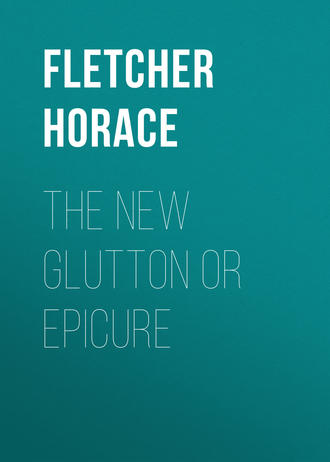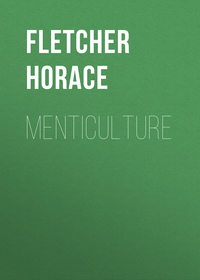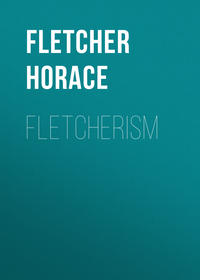 полная версия
полная версияThe New Glutton or Epicure
I have personally interviewed a patriarch, who, at sixty-five, was awaiting death with constant expectancy, and was helping to attain it by every sort of favourable suggestion. It happened that he had his portrait taken in a photograph gallery on his sixty-fifth birthday as a last souvenir to be distributed among his friends. Shortly after that, in the fruity and salubrious foothills of the Pacific Coast of California, he met with accidental suggestion which changed his habits of living, and, very soon, his attitude toward life and death.
I sat with the patriarch on his one hundredth birthday in the same photograph gallery, examined the portraits of sixty-five and one hundred years, conversed with the subject in a low tone of voice, looked upon a man who felt that he was yet in middle life, and in possession of an enjoyment of life that he said had never been equalled in the early years of his bondage to the ignorance and impatience of youth.13
STUDY NATUREWatch good Nature, observe her methods, try to imitate them by way of experiment, and you will find that, as heretofore stated, there is a perfect way enfolded in all of Nature's problems and that man has only to discover the way to have it freely accessible to him.
Watch a child take its nourishment in natural manner. The sucking action is like the act of mastication in that it excites the glands which supply fluids to the mouth. Whatever number of these fluids there may be, I will class them all as saliva. Certainly in the case of milk being taken into the stomach, saliva is not needed to lubricate it. It is, therefore, reasonable to suppose that saliva is intended as a part of the mixture necessary to digestion; that is, to the conversion of the food into nutriment.
In the case of children nourished at the breast of the mother – the only natural way – the food is already alkaline and ready for digestion in the stomach and intestines as related previously.
Remember also that, in the case of invalids with very weak stomachs, physicians recommend taking milk and broth through a straw or through a glass tube. Taking fluid this way requires a sucking action of the mouth and thereby induces a flow of saliva. Of course, the fluid is better digested than when drunk because Nature's way has been followed, and it is no wonder that milk and often soups of different kinds are indigestible, if taken contrary to the natural way, except in digestive systems which have not yet exhausted their ten-horse-power resistance capacity.
I have tried milk and soups upon a stomach trained down so fine that it was like a pair of apothecary's balances, sensitive to the least inharmony, to find that if they are drunk there is a mild protest – a sort of a shrug of the shoulders, as it were – and that when the same liquids have been moved about in the mouth for the time necessary to naturally excite the Swallowing Impulse, they have passed into the stomach without the owner being conscious afterwards of their presence except by feeling of complete satisfaction.
It would seem, therefore, that the perfection of nutrition requires the proper mixture of saliva added to all food substances, and that mastication is not only a means of separation in order to give saliva a chance but a valve opener for salivary glands in order to make the proper solution for the stomach; and, that taste exists, in one of its important functions, to indicate how long the process should continue and when it has effected its healthful purpose.
Any one who tries it, no matter how perverted the taste has become by abuse, will find that Nature is not only kind but alluring. Meat or bread, without sauces or butter, are tasteless, in a degree, when first taken into the mouth dry. It is for this reason that butter, sauces, salt, sugar, etc., are used to make them what is called palatable. It is the salt or the sugar or other spices in these which excites the palate immediately when the dry morsel would not do so in such marked degree.
If you take the meat or the dry bread and masticate sufficiently, allowing the nutriment to become thoroughly solved by the saliva and separated from the dirt, – the indigestible, tasteless remainder – the taste will become more and more delicious as the saliva gets possession of the solution, and will have a final delicacy which sauces cannot equal, as a reward for pursuing Nature's invitation and rendering her the appointed service.
An easy experiment that will prove the above statement to be correct is to take a variety of breads, white and brown, toasted and untoasted, crust and soft, and afterwards some of the same soaked in soup or milk, or, in the juice of whatever meat you happen to have at your meal.
Taken dry, toast will only reduce and disappear, without effort of swallowing, into the stomach, leaving no tasteless dregs behind, after about thirty actions of the jaw. This is probably the reason why toast is an invalid's best diet; because mastication is required to crush it, saliva is liberated by the acts of mastication, less saliva is required to prepare toast for the stomach than any other form of bread, and therefore, the proper conditions are attained perforce, and easy digestion is promoted. Crust of French bread will do the same by means of about forty jets let loose by mastication; the soft inside of French bread will require fifty, or more; crust and inside of biscuits and of "home-made" bread somewhat more than the French bread; while "Boston brown bread" requires as many as seventy to eighty jets turned on by action of mastication to dissolve it.
The above refers to moderate mouthfuls. The process is incomplete until all is dissolved, taste ceases, and natural swallowing occurs.
Will it not be observed that mastication, as far as crushing or mangling is concerned, has small part in the reduction of "Boston brown bread," and little seeming use except to turn on the jets of the solving saliva, for the material itself is soft, and sometimes "mushy"? Saliva has little use as a lubricant in this case, for the reason that the brown bread experimented with can be easily swallowed when first taken in the mouth. Abundant experiment has been made by those to whom "Boston brown bread" was formerly little less than a poison, to prove the assertion that, sufficiently mixed with saliva, it is perfectly digestible and that the delicious taste of the bread after forty or fifty bites (⅓ to ½ minute) gets sweeter and sweeter, and attains its greatest sweetness and most delicate taste at the very last, when it has dissolved into liquid form and most of it has escaped into the stomach.
It will be noticed that the time, or attention, required to solve these different problems of nutrition as embodied in different sorts of breads is exactly proportionate to their recognised digestibility, and explains the reason why hot and "soggy" biscuits, after the American fashion, and "Boston brown bread" have been classed as not easily digestible.
Still further proof of my contention in favour of the importance of taste as a guide and guard in the process of nutrition is that, if you soak soft bread, or even toast, in the juice or gravy of any meat, the number of masticatory or tasting movements necessary to fit it for the stomach and satisfy the taste will be about the number required to masticate raw meat from which the juice has come and not such only as would seem requisite on account of the softness of the substance when made pulpy by soaking and which might be forcibly swallowed at once.
Tests like these alone are sufficient to prove my contention, but, when the result of the experiments is so immediate for good in every direction, as it has proved itself to be in all cases tried, there is no longer doubt but that Nature's most important secret relative to human alimentation has been heretofore practically undiscovered; that is, as far as any inquiry I have been able to make sheds light upon the subject.
The result, in all the cases of my observation, has been an immediate response of naturally increased energy; approach of weight toward the normal, whether the subject was over-weight or under-weight; a great falling off of the waste to be discharged by the avenue of the lower intestines and also through the kidneys; relief of bleeding hemorrhoids and catarrh – the diseases suffered by the patients; emancipation from headaches; clearing of the tongue of the yellow deposit – usually called fur – that is an indication of rotten conditions in the stomach; and return of the energy for work which all men and women should have, and which finds expression in healthy children in the form of great energy for play.
The tax upon the lower intestines has been, in my experiments, reduced so that there was no invitation to relief more frequently than once in four or five days, and the quantity of the deposit was less than half the quantity of a usual daily contribution to waste under former methods of taking in nourishment, thereby proving the fact that appetite and taste, when given full chance to serve, serve us well.
This feature (quantity of waste) differed in the cases of the different persons experimented with according to the carefulness with which they obeyed the test injunctions. In some, greed abnormality could not quickly be overcome, but, as the subjects were selected in part from the stratum of society where want is the constant dread, it is not to be wondered at that a lifetime habit of tremor and greed should resist even the dictates of their reason. But it was in these that the revelation excited the highest appreciation at last when they were put in possession of faculties and strength that they had supposed the Creator had denied them in a world of suffering.
There is no doubt but that it is possible to introduce nutrition into the system wherein, or rather wherewith, there is little or no waste material.
One physician, to whom I applied for information, suggested that too fine an application of my method might finally do away with the lower intestines altogether from the same cause that any unused member of the body, and also unnourished members, shrivel and disappear in time.
While this is possible, the means taken towards it are productive of marvellous good results; and, if there were no further use, what purpose would they serve?14
Think of the number of separate complaints that are attributable to trouble of the lower intestines, and think of the relief coming with their return to normal conditions in performing infrequent service with the ease of rejuvenated strength! Such was the case with all of the subjects under test, and it was a revelation which was as the opening of a new life to even those who had suffered least, and had thought themselves fortunate as to health conditions.
I hope I will be excused for using the terms "dirt," "rotten," "glutton," etc. I know they will give a shock to sensitive conventionality, but is it not better to shock conventionality with a proscribed term, if it means just what it says, and nothing else, than to shock the delicate organism of our machinery of life by throwing dirt into its furnace with good fuel, and thereby allowing the glut of ashes therefrom to encumber the journals of our mechanism, to the waste of our power and to the wearing out of our machinery?
Disease is nothing but dirt in the system and the result of dirt. It is our own dirt at that, having been introduced by our own carelessness or as the result of combined ignorance and greed.
Ignorance has excused and does excuse the responsibility; but, when we have providentially been provided a way by Nature to select and sift and prepare perfect fuel for the furnace of our Life-Power-Plant, there can be no further excuse for not following the teaching to the extreme of the last possible refinement.
I will not presume to say what and whom good Doctor Appetite, with the assistance of Doctor Taste, can cure. They have both cured and greatly relieved rheumatism, gout, eczema, obesity, under-weight, bleeding-piles, blotches and pimples, catarrh, "that tired feeling," muddy complexion, indigestion, and yellow-tongue, within four months. It has been revealed that attention to their invitation and warning cures unnatural craving and beautifully appeases appetite desires with one-third the usual food; and, at the same time, they teach an appreciation and enjoyment of food quite new even to bon vivants.
Any person can employ Dr. Normal Appetite and consult Dr. Good Taste free of all charge, and make endless discoveries in the possibility of delightful and healthfully economic nutrition.
The suggestion was originally given by the author in crudest form with the assurance of physiologists that trial of it involved no risk, but, on the contrary, that it led in the right direction toward preventing disease. I felt that it was too important to be withheld from those who do not know the existence of Nature's perfect way provided by the Senses of Appetite and Taste.
Record of careful tests and results will probably follow in another volume. The author has entered the field of investigation to find deterrents to Nature's perfect development and will not rest while any remain.15
With even the crude hint, that health can be secured and maintained by consulting and respecting Appetite and Taste, each person having either can assist in the investigation.
SUGGESTION AND DIRECTIONSFor initial experiment, do not change any of your present habits of living as to time of meals, kind of food, etc.
Following the directions given hereafter will undoubtedly lead to just the right thing for you in these regards.
There is no doubt but that the early morning meal is not productive of the best results in nutrition and strength, but it is better to have Appetite suggest the necessary change in accustomed habits. Dr. Dewey's advice in the "No-Breakfast" regimen is excellent. The getting-up craving is not an earned appetite.
Forced abstinence from a heavy morning meal will surely bring about normal conditions of appetite which are best adapted to perfect nutrition, so that if the invitation to give up the morning gorge voluntarily does not overcome perverse habit, the heroic denial may be tried.
The value of the discovery lies in recognising the fact that Taste still has important work to do with passing food while yet there is taste, and that what remains after Taste ceases to express itself should not go into the stomach.
The ease with which one will learn to enjoy and "hang on" to food in the mouth, even milk and soup, after he has learned a good reason for doing so, will quickly create a counter habit which is in accordance with Nature's perfect way.
When one has discovered the delight of that last indescribably sweet flash of taste, which Taste offers as a pousse café to those who serve it with respect, he will find any food that Appetite selects is needed for his nutrition, and is good.
Remember this! Salt, sugar, some sauces and spices which are used to make food palatable may be in themselves nutritious, but do not let them mislead you. The tendency is to relish them and think that they represent the food they disguise, which, however, is often only an excuse for them, and has very little nutrition itself. In this case a morsel of food is taken into the mouth, the sauce or spice which it carries meets immediate response from Taste and disappears, whereupon the indigestible food morsel is swallowed in indigestible condition so as to admit another sauce-laden supply.
The most nutritious food does not require sauces. It may seem dry and tasteless to the first impression, but, as the juices of the mouth get possession of it, warm it up, solve its life-giving qualities out of it and coax it into usefulness, the delight of a new-found delicacy will greet the discoverer.
It may be difficult, at first, to avoid swallowing food before it is thoroughly separated, the nutriment dissolved and the dirt rejected, but after a little practice there will be no difficulty. On the contrary, there will be an involuntary habit of retention established that will be as tenacious of a morsel of food till that last and sweetest taste has been found, as a dog is tenacious of a savory bone.
Did it ever occur to gum chewers that the gum is simply an exciter of saliva, and that the sweet taste is the nutritious dextrin in the saliva and has nothing to do with the gum? In the ordinary "watering of the mouth" the same sweet taste is experienced.
Another important fact in this connection, and which belongs in the list of "directions" because it is a leader, is, that perfect nutrition is a source of ample saliva, the effect thereby reproducing the cause in friendly reciprocity.
It will be found that, when normal conditions have been attained through attention to the inspection, selection and rejection of Taste, when the tongue has lost its malarial yellow scum and when Hunger is represented by healthful Appetite and has dismissed bilious and insatiable Craving from its service, there will at all times be a delicately sweet taste in the mouth which will prevent craving for anything else. For instance, a person in possession of normal taste conditions may pass a confectionery shop or a fruit stand without temptation to eat of their wares, for they would spoil the taste already in possession of the mouth.
The expert wine tasters in Rhineland, where the full flavour of the luscious fruit is retained in the wine as Nature put it there, never drink wine. They breathe it into the mouth and atomise it on the tongue with utmost relish. To them the swallowing of the precious juice without dissipation by taste is an unpardonable sacrilege. The Bavarians also, whose beer is the best in the world, practically do not drink beer as Americans are accustomed to seeing it drunk. They sit over a stein of beer for an hour, reading or chatting with friends. The epicurean drinkers of what has been termed eau de vie in France sit and sip a "pony" of their beloved Cognac while they enjoy a view of pastoral loveliness or a throng of passers-by in a boulevard of Paris. None of these people drink anything but water and hence are not drunkards; and, at the same time, they have full enjoyment of Nature's most stimulating and delicious compounds in a form preserved by Nature for the use of man.
The taste of these students of nutrition becomes so discriminating that they can distinguish a wine or a beer or a cognac, as they would distinguish between intimate friends and strangers. The year, the vineyard, the state of the weather, or any accident that may have surrounded the development of the fruit are as distinguishable to these epicures in the essential juices as are the marks on men which indicate prosperity, happiness or any stamp of environment whatever.
An epicurean cannot be a glutton. There may be gluttons who are less gluttonous than other gluttons, but epicureanism is like politeness and cleanliness, and is the certain mark of gentility.
A physiological chemist, a friend of the author, who is responsible for the suggestion that the function of saliva in turning the starches of our food into nutritious glucose may never have been fully given a chance to act, thus accounts for the last delicate sweet taste which is attained by complete mastication. It is then a perfect solution, and hence the delicacy of the taste.
For illustration, try a ship's biscuit – commonly called hardtack – and keep it in the mouth, tasting it as you would a piece of sugar, till it has disappeared entirely, and note what a treasure of delight there is in it.
Taste will teach the experimenter more than I can even suggest. I simply offer an introduction to Doctor N. Appetite and to Doctor G. Taste and state some of their excellences that I have discovered through their attentions to myself and others under my direction.
I will, however, give a resumé of my own experience as a guide.
PERSONAL CASE, INITIAL CONDITION
Age, 49 years; height, 5 feet 7 inches. Extremes of weight for fifteen years (in ordinary clothing) minimum, 198 lbs.; maximum, 217 lbs. Chest measure, varying but little, if any, 42 inches; waist measure (tailor's) 43 to 44 inches. Usual weight during the time, about 205 lbs.
My experiments began near the middle of June, but with no systematic application until the middle of July, 1898; weight on June 1st, probably over 205 lbs., in summer clothing.
SPEEDY IMPROVEMENTOn October 10th, as a result of the experiments, weight 163 lbs., and stationary; chest measure same as before, but waist measure reduced to 37 inches, or one inch below the "tailor's ideal," and nearly down to the "athlete's ideal."
The energy and desire for activity with immunity from fatigue, which was the characteristic equipment of twenty years ago returned, but not, of course, the trained muscular strength or suppleness of athletic days.
The food invited by Appetite at this stage, the nutriment in which counter-balanced the waste in each twenty-four hours, consisted of about thirty ordinary mouthfuls of potato, bread, meat, or anything selected by Appetite, masticated and manipulated to the end.
One meal a day was taken for convenience, and because it seemed, under the then existing circumstances, hot summer weather, to be the time set by Nature for eating. "I rise in the morning," as a champion pugilist once put it, "when my bed gets tired of me," which at the time was usually before, or at, daylight, and began writing or other work. By one o'clock I usually was "worked out," but had already disposed of practically a day's work. Then, in the middle of the day, when all the animals rest and some of them chew the cud, I took my meal. I had not, meantime, experienced a moment of craving for anything since the meal of the day before, but I sat down with an epicurean appetite.
The article of food on the menu that first attracted me, I fixed my desire upon. At the time it was usually a meat or a fish, and there accompanied it only a cup of coffee, nine-tenths milk, bread and butter, and potato. Sometimes the meat selected was an entrée, and was garnished with rice and other fruits or vegetables.
About thirty mouthfuls of these, disposed of in something less than twenty-five hundred acts of mastication or other movement of the mouth, and taking about thirty minutes to thirty-five minutes, satisfied the appetite so perfectly that all the ices and desserts on a sumptuous bill of fare had no attraction.
In the meantime, water was drunk, in small portions slowly, and ice water at that, without restriction, to satisfy thirst, but not when any food was in process. In the mouth the water was almost instantly brought to body-temperature and its coolness was very agreeable to all the senses. I now rarely take any water except in very hot weather when perspiration is active and then only enough to quench thirst, excess giving discomfort and necessitating more perspiration. Water injures digestion by being taken with meals only because it is used to wash down food not yet prepared for the stomach. It is the unfit food that is carried down by it and not the water that does the harm.
One cup of café au lait, well sweetened, sipped and enjoyed according to the epicurean method, satisfied all desire for other sweets and created a harmony of variety that was simply perfect, while it was perfectly simple.
I did not try to work, or think, for some time after the meal; that is, I did not force thought; but reading, a cat nap, a walk, a matinée, a ball game, or a ride in a trolley car were recreations which I was able to enjoy as a sort of pousse café for two or three hours after the meal, and then the energy for work returned, so that if there were something yet to be done in the time before the accustomed bed hour, another day's work was easily accomplished.
Athletic work, physical labour, extreme activity in any form, all benefit by the same treatment, as I have since been able to prove both personally and by experiment with others. The only difference is the greater waste of tissue, and the greater need for restorage, demanding an evening meal and possibly an earlier midday meal.
Exercise, work, activity – anything that creates a demand for nutriment is the especial friend of Taste. It gives healthy appetite and hence there is plenty for Taste to do and he likes to be of service.





